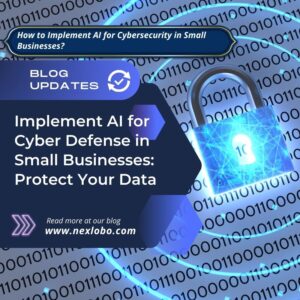Implement AI for Cyber Defense in Small Businesses: Protect Your Data

As someone who’s spent several years helping small businesses implement effective cybersecurity measures, I’ve seen firsthand the devastating impact a cyberattack can have. One of my clients, a small retail business, suffered a severe data breach when hackers exploited their outdated security systems. This experience made it clear to me that small businesses must start to implement AI for cyber defense to stay safe from growing cyber threats.
In my career, I’ve worked with businesses of all sizes, and one thing I’ve learned is that AI can make a tremendous difference in improving cyber defense. Not only does AI help small businesses stay ahead of threats, but it can also be affordable and scalable. If you’re wondering how to get started, it’s easier than you might think. If you’re looking for more information on how AI can be used for better data encryption, check out this article on how to integrate AI tools for better data encryption in cybersecurity.
Why Small Businesses Need to Implement AI for Cyber Defense
For small businesses, the need to implement AI for cyber defense has never been more urgent. Hackers aren’t just targeting large corporations; small businesses are becoming prime targets because they often lack the robust security systems that larger companies have. Unfortunately, many small businesses don’t realize that AI-driven cybersecurity tools can provide them with a level of protection that rivals that of much larger enterprises.
According to a 2024 report by Cybersecurity Ventures, small businesses that implement AI-based cybersecurity solutions reduce their risk of data breaches by 40%. This statistic highlights just how effective AI can be in preventing cyber threats. From personal experience, I’ve seen how implementing AI for cyber defense can help businesses protect against everything from phishing attempts to ransomware. One of the most significant challenges for small businesses is that they often don’t have the resources for 24/7 monitoring. However, AI for cyber defense offers constant, real-time monitoring that can identify and neutralize threats quickly, helping businesses remain secure without the need for a dedicated security team.
How to Implement AI for Cyber Defense in Your Small Business
Implementing AI for cyber defense doesn’t have to be complicated. I’ve worked with many small businesses, and I can tell you that getting started with AI-powered cybersecurity tools is simpler than you might think. Here’s how you can begin:
Start with a Security Audit: Before you implement AI for cyber defense, it’s important to conduct a security audit to understand where your vulnerabilities lie. Identify potential weak points in your network and systems, such as outdated software or gaps in your current security measures. If you’re looking for more in-depth information on cybersecurity best practices, check out our article on how to protect your website using cyber-attacks guard tools.
Choose the Right AI Tools: The next step is to choose the AI tools that best fit your business needs. Tools like AI-powered firewalls, intrusion detection systems, and malware scanners are great options to start with. I’ve found that businesses often feel overwhelmed by the number of options out there, but starting with a few key AI tools can make a significant difference in enhancing your security.
Integrate AI with Existing Security Infrastructure: Implementing AI for cyber defense doesn’t mean replacing everything you currently have in place. Instead, think of it as enhancing your existing security infrastructure. AI can work seamlessly with firewalls, antivirus software, and other security tools to provide an extra layer of protection.
Train Your Team: To maximize the effectiveness of AI for cyber defense, ensure that your staff is trained on how to use these tools. I always recommend providing training sessions to ensure that your employees know how to respond to alerts, recognize potential threats, and take quick action when necessary.
How to Choose the Right AI Tools for Cyber Defense
When it comes to implementing AI for cyber defense, choosing the right tools is crucial. Here are a few key factors to consider when selecting your AI tools:
Scalability: As your business grows, your cybersecurity needs will evolve. Choose AI tools that can scale with your business and provide the flexibility to adapt as your security requirements change.
Affordability: AI-based cybersecurity tools are now more affordable than ever. While some solutions may require significant investment, there are many scalable options available for small businesses that provide high levels of protection at a reasonable cost.
Ease of Integration: The AI tools you select should integrate easily with your existing security infrastructure. Look for tools that provide seamless integration with your current firewalls, antivirus software, and other cybersecurity systems.
Proven Effectiveness: Choose tools that have a proven track record in cyber defense. Reading case studies, reviews, and testimonials can help you identify the most reliable solutions for your business.
How to Monitor and Optimize AI for Cyber Defense in Your Business
Once you’ve implemented AI for cyber defense, it’s essential to continuously monitor its performance and optimize its effectiveness. Here are a few tips on how to stay on top of your AI tools:
Regularly Review Alerts and Reports: AI tools will generate alerts and reports when suspicious activity is detected. It’s crucial to review these regularly and act on any red flags to prevent cyberattacks.
Update and Fine-Tune AI Systems: AI systems require regular updates to stay effective. Over time, the AI will learn and improve, but providing feedback on false positives or missed threats can help fine-tune its capabilities and improve its accuracy.
Adapt to New Threats: Cyber threats are constantly evolving, so it’s important to regularly update your AI tools to stay ahead. Make sure your tools are configured to detect new attack patterns and emerging threats, ensuring that your business remains protected.
How to Stay Ahead of New Threats for Better Cyber Defense with AI
AI’s role in cyber defense will only grow more critical as new threats emerge. Here’s how AI can help small businesses stay ahead of these threats:
AI for Predictive Threat Detection: AI can analyze vast amounts of historical data to predict future threats and prevent them before they occur. By implementing AI for cyber defense, businesses can stop attacks before they even begin.
AI-Driven Incident Response: When a cyberattack occurs, AI tools can respond instantly by neutralizing the threat and minimizing damage. This quick response time is essential for small businesses that need to limit exposure and maintain business continuity.
Real-Time Threat Intelligence: With AI, small businesses can gain real-time insights into cyber threats. AI tools can monitor the web for potential threats and adapt in real-time to changing attack methods, helping businesses stay one step ahead.
How AI Can Help Small Businesses Scale Their Cyber Defense
As your small business grows, your cyber defense needs will also evolve. AI tools can help you scale your cybersecurity as your business expands:
Scale Up AI Tools with Your Business: As your company grows and you add more employees, data, and systems, AI tools can scale to accommodate increased demands. This ensures that your AI for cyber defense continues to be effective as your business grows.
Automated Threat Detection: With more data comes more risk. AI tools can automate the detection of threats across multiple systems, ensuring that your growing network remains secure without the need for manual intervention.
Data Protection at Scale: As your business collects more data, AI-powered tools can help ensure that this data remains secure. By using AI for encryption, anomaly detection, and access control, small businesses can protect sensitive customer information as they scale.
Conclusion
As cyber threats continue to grow in complexity, it’s essential that small businesses implement AI for cyber defense to stay ahead. The process may seem daunting, but with the right tools and strategies, AI can make your cybersecurity stronger, smarter, and more responsive. Start by assessing your current security measures, selecting the right AI tools, and integrating them into your infrastructure.
If you’re ready to implement AI for cyber defense in your small business, don’t hesitate to reach out for expert advice on choosing the right tools. For further guidance, check out our article on how to use AI to detect cybersecurity threats in real-time for more insights into AI-powered cybersecurity.
Ready to protect your business with AI? Contact us for a demo or subscribe to our newsletter for the latest updates on AI-powered cyber defense.




